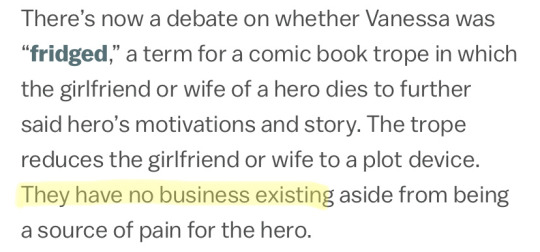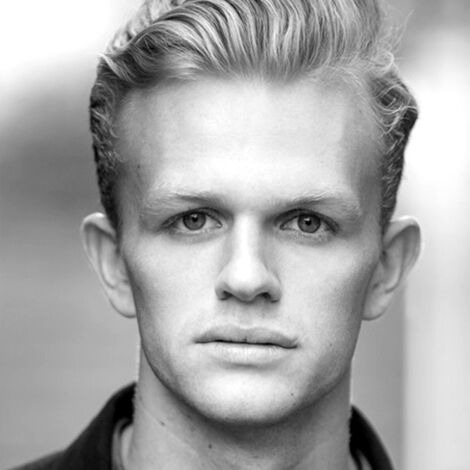#alex abadeer
Text

“gUUUUrl you would not BELIEVE the day I’ve had listen up…”
#shut up alex#personal#adventure time: fionna & cake#adventure time#marceline#ice king#ice king adventure time#marceline the vampire queen#marceline abadeer#simon petrikov
352 notes
·
View notes
Note
Do you have any favourite lgbtq+ characters or ships? 🌈
lots!! I adore Katie Mitchell, Will Solace, Sammy Gutierrez, Nico di Angelo, Alex Fierro, Yasmina Fadoula, Marceline Abadeer, Barney Guttman, Charlie Spring, Nick Nelson and so many more
favourite ships is probably solangelo, bubline, and klance ( Keith x lance from Voltron, though it's not canon ).
#pjo#hoo#toa#tsats#Nico di angelo#will solace#chaos theory#sammy gutierrez#yasmina fadoula#katie mitchell#alex fierro#marceline abadeer#barney guttman#Charlie spring#Nick nelson#gay#mlm#bisexual#queer#wlw#lesbian#ships#lgbtqia#pride#advice#lgbtq#lgbtq community#information#lgbt
16 notes
·
View notes
Text
Alex Abad-Santos & Caroline Framke, “Meats Ranked”, VOX, 2016, PART TWO (II).
Here I present: Alex Abad-Santos & Caroline Framke, “Meats Ranked”, VOX, 2016, PART TWO (II).
1. INTRODUCTION.
ATOP in gray color with black & red type is my Table of Flesh Protein and Flour Protein. Flesh protein is: Meat, Bird, Finfish & Shellfish. Flour protein is: Atta, Bajra, Besan, Rice, Dalia, Rava/Sooji, Urad, Maize, Mung & Maida.
2. MEALTIME FORMULA.
”A picture is worth a…
0 notes
Text
Laghonia - Glue, 1970. 🇵🇪
#laghonia#thenewjugglersound#saul cornejo#manuel cornejo#eddy zarauz#davey levene#carlos salom#alex abad#1970#discos mag#mag records#vibratorysounds#eclecticmud
0 notes
Photo

Shazam! Fury of the Gods’ credits scene teases a future that might never come
https://www.vox.com/culture/2023/3/16/23643089/shazam-fury-of-the-gods-credits-scene-explained
0 notes
Text
Alex Abad-Santos at Vox:
Despite being a time when people from all over the world come together in equality and peace, the Olympics are still uncertain territory for transgender athletes. There are no transgender athletes who are competing outside of the gender they were assigned at birth at this year’s Games. Transgender women who transitioned after puberty aren’t allowed to compete in major sports on a college level.
Athletes Nikki Hiltz, a runner, and Hergie Bacyadan, a boxer, both identify as transgender (Hiltz also identifies as nonbinary), but both have always and continue to compete in the women’s division, which is the sex they were assigned at birth.
Athletes who do not identify as trans, like Algerian boxer Imane Khelif, have also been scrutinized for their gender. Along with China’s Lin Yu-ting, Khelif is one of two women boxers who failed a “sex test” from the International Boxing Association last year.
They have since been connected to discussions of sports and Differences of Sexual Development (DSD), a rare group of genetic and hormonal disorders allowed under International Olympic Committee guidelines. After Khelif’s Italian competitor Angela Carini conceded their match less than a minute into their bout, many have weighed in, including Elon Musk and J.K. Rowling.
Outside of the Games, trans people face so much backlash, often for simply existing. The conversation around sports is particularly fraught, from children’s athletics right up through the pros. Despite the International Olympic Committee vowing to be more inclusive, the future for trans athletes is unclear.
It all raises the question: How did we get to this point, and did it always have to be this way?
The answers found in historian and journalist Michael Waters’s The Other Olympians: Fascism, Queerness, and the Making of Modern Sports might be surprising. Waters’s book traces the emergence of Zdeněk Koubek, a track and field star representing the country formerly known as Czechoslovakia who, at 21, won two medals — a gold in the 800m and a bronze in the long jump — at the 1934 Women’s World Games. (The Women’s World Games was the precursor to women competing at the Olympics). In 1935, Koubek announced that he would be living life as a man and swiftly became an international celebrity.
Perhaps the most intriguing facet to Koubek’s story was in the public response. Koubek was more welcomed and celebrated than we might imagine. There was an open-mindedness and empathy to the reception of Koubek and his gender identity and expression in the 1930s.
Waters also pinpoints where and when that changed, specifically at the 1936 Olympics in Nazi Germany. Armed with a propensity for eugenics, gender anxiety, and a startling lack of scientific evidence, a small set of Nazi officials influenced the International Olympic Committee into gender surveillance and trans panic — stuff that eerily mirrors the transphobic attacks that athletes, cis and trans alike, face today.
Anti-trans discrimination in the Olympics stretches as far back as the infamous 1936 games in Berlin.
#Olympics#Transgender#Transvestigations#LGBTQ+#Lin Yu Ting#Imane Khelif#Hergie Bacyadan#Nikki Hiltz#Zdeněk Koubek#1936 Berlin Olympics#1936 Summer Olympics
62 notes
·
View notes
Text










the girl as immaterial - padme amidala
matthew stover // nabokov // aja romano & alex abad-santos // george lucas // roger ebert
#star wars#padme amidala#web weaving#revenge of the sith#revenge of the sith novelization#star wars prequels#star wars edit#star wars parallels
274 notes
·
View notes
Text
Starlight Express Cast 2023 - 2024 (part 2)



Coco: Molly Scott (cover Dinah, Belle, Carrie)
Espresso: Nathan Daly (cover Rusty)
Ruhrgold: Owen Broughton (cover Greaseball, Dustin, Flat Top)


Manga: Vladimir Hub (cover Rockies)
Brexit: Kevin Köhler (cover Rusty, Caboose)


Trax 1: Nils Rinas
Trax 2: Jeremy Suarez
Trax 3: David Prajz (I don't have a headshot for him </3)
Swings



Jake Bishop - (cover Rusty, Caboose, Flat Top, Dustin, Rocky 1+2, Killerwatt, Engines)
Josh Crowther - (cover Rocky 1+2, Wrench, Killerwatt)
Sheri Lineham - (cover Belle, Carrie, Coco, Joule, Wrench, Rocky 3)



Dieuwke Tönissen - (cover Dinah, Pearl, Momma, Belle, Carrie)
Jessie Angell - (cover Belle, Brexit , Carrie, Rocky 3, Coco, Components)
Kai Cameron-Jay - (cover Caboose, Rocky 1, 2, 3, Wrench, Killerwatt, Volta, Engines)



Farah Liss - (cover Belle, Carrie, Rocky 3, Wrench, Joule, Coco)
Jay Le Marrec - (cover Dustin, Rockies, Engines, Killerwatt)
Alex Abad - (cover Flat Top, Rocky 2+3, Wrench, Volta, Killerwatt, Engines)



Jamie Landmann - (cover Caboose, Dustin, Flat Top, Killerwatt, Engines)
Tom Nihill - (cover Electra, Caboose, Dustin, Rockies, Engines, Components)
Michael Eborall - (cover Flat Top, Components, National Engines, Rocky 1 & 2)


Brad Corben - Assistant Skate Coach & Assistant Dance Captain - (cover Dustin, Rocky 1, 2, 3, Engines, Components)
Mark Fries - (cover Flat Top, Killerwatt, Volta, Engines)


Demy Janssen - (cover Pearl, Dinah, Carrie, Joule, Wrench, Volta, Rocky 3, Coco)
Jessica Lapp - (cover Belle, Carrie, Coco, Rocky 3, Brexit, Components)
27 notes
·
View notes
Text
Alex Abad-Santos at Vox:
For taxonomic purposes, Eurovision is an international song contest. Technically, the European Broadcast Union (EBU) created the event in 1956 to foster post-WWII European unity, but has largely expanded beyond that function and Europe itself, with countries like Australia and Israel participating. The closest reference point for people in the US is American Idol, the extremely popular reality television singing contest that once crowned national treasure Kelly Clarkson.
Think: polarizing and sometimes very disparate musical acts from each represented country, a public vote, and a night of live performances, but with the added elements like spooky Austrian comedy and whispers of a rigged vote for Sweden.
Is there any better way to symbolically present peace than getting in costume and singing a silly pop song in a lighthearted musical competition? What if I told you that there is no prize money for the winning country’s band — only bragging rights, a trophy, and national hosting duties for the next Eurovision?
There is absolutely nothing like Eurovision.
With nothing and seemingly everything on the line, Eurovision has become an international spectacle, perhaps the international spectacle aside from the Olympics. It’s a fantasy that both undergirds and undermines everything you think you know about Europe and pop music. But as we gear up for another chapter of ostentatious music acts sing-fighting for zero money, the biggest story heading into this week’s (May 7 to May 11) contest in Malmo, Sweden, threatens that escapist reputation. Protests over Israel’s participation have punctuated the lead-up to the event, with activists asserting that Israel should be barred, given its military assault in Gaza, which has killed tens of thousands.
It’s far from the first time that politics and war have made their mark on the proceedings, but now Eurovision faces a huge question over its existence, its history, and who is and isn’t allowed to take part in a competition that’s supposed to really be about European novelty.
Eurovision can’t be replicated
Eurovision usually bends toward more conventional, meaningful winners like last year’s Loreen (who has won twice), 2016’s Jamala, and 2021’s Måneskin. ABBA and Celine Dion have also won the competition, and are its most famous alums. This year the UK’s Olly Alexander, from the successful pop band Years & Years, seems like a ringer.
But the winners only tell part of Eurovision’s story. Eurovision can feel vaguely psychedelic, which is what makes it a joy to behold. And the contest is at its best when it leans into unmitigated absurdity and the unexpected.
Take, for example, Austria’s 2023 entry: “Who the Hell is Edgar?” by Teya & Salena. The female duo met on Starmania, a talent show in their native country, and wrote “Who The Hell is Edgar?” to address “an industry that all too often doesn’t give women enough credit for their hard work and expertise,” according to the official Eurovision website.
[...]
How Eurovision winners are crowned
As my colleague Zack Beauchamp has previously detailed, voting is split between a popular call-in vote from the public and a jury that consists of music industry professionals from each participating country. Thirty-seven participants will compete in semifinal rounds — beginning on May 7 — in hopes of qualifying for one of the 26 total spots in the grand final on May 11.
Jury voting is like Olympic judging, with each country giving out a maximum of 12 points (and all the way down to one) to the twelve best of the night in the grand finale.
Sometimes, the jury vote — the vote from music professionals — doesn’t exactly coincide with the televote. Last year, the judges picked Loreen from Sweden’s “Tattoo”, while the public selected Käärijä from Finland’s “Cha Cha Cha” as the best of the night. The jury placed Finland fourth, which spawned a conspiracy theory about rigging Sweden’s win so the country could host in 2024, the 50th anniversary of when ABBA won.
The low-ish stakes make for a fun bit of drama, but the disconnect between the jury and the popular vote has led to questions about why the jury votes have as much sway as the millions of calls coming through. Perhaps they shouldn’t; the winner would likely be a little more out of the box if the more conventional jury votes didn’t carry equal weight.
Sweden’s alleged rigging is also not unlike some previous bits of Eurovision history, like the time Switzerland picked noted Canadian Céline Dion to represent the famously neutral country in 1988. Rules at the time did not specify that a singer had to be born in the country they represented, and Dion was a burgeoning star internationally. Dion, of course, won the whole thing.
That said, while Eurovision is a “competition” and a winner is crowned, megastars like ABBA and Dion are exceptional exceptions of Eurovision victors. Eurovision winners don’t usually become worldwide superstars. The list of winners — 1982’s Nicole? 2002’s Marie N? 2006’s Lordi — are probably blue Wikipedia links for normies. That should underscore the idea that Eurovision is really about the entertainment of the night, the stunts, the scintillating swing for the fences, rather than the actual score.
[...]
Can Eurovision still be fun this year if the biggest story about Eurovision is Israel-Palestine?
Ahead of the competition in Malmo, the lead-up to Eurovision this year has been a series of protests and proposed boycotts against Israel’s participation in this year’s competition. The gist: Israel should not be allowed to participate in Eurovision because of its continued attacks in Gaza. A country at war shouldn’t perform at an event about unity and peace.
The opposition to Israel’s inclusion — Israel has participated in Eurovision since 1973 — isn’t without precedent. Critics of Israel’s participation point out that just two years ago, Eurovision disallowed Russia in a similar situation.
On February 25, 2022, Eurovision banned Russia a day after its invasion of Ukraine. At the time state broadcasters from participating countries like Iceland, Finland, Norway, and The Netherlands called for Russia’s ban, which the EBU ultimately granted, citing Eurovision’s mission to protect “the values of a cultural competition which promotes international exchange and understanding” and saying that the event “unites Europe on one stage.”
Speaking on the ban, Eurovision’s executive supervisor Martin Österdahl said that Russia’s exclusion was a decision about upholding the core values of democracy and human rights core to the event’s spirit. “When we say we are not political, what we always should stand up for are the basic and ultimate values of democracy. Everyone is right to be who they are,” he said in December 2022.
Since then, Russia has suspended its EBU membership and has not returned to the competition.
[...]
While Curran insists that the contest will be apolitical, its actions might not be interpreted as such. Palestinian flags will not be allowed at the competition nor will any pro-Palestinian symbols or signs referring to Israel and Hamas’s war. The Israeli flag will be allowed because it’s a member state and only participants’ flags are permitted, with the exception being rainbow and LGBTQ flags.
Eurovision is a singing competition that technically supposed to be an apolitical event, but inevitably, politics shows up one way or the other, as we see in jury votes. This year, Ireland’s act was forced to change their pro-Palestine message, and the mere presence of Israel in the competition has caused calls for protests and boycotts.
The winner gets to host the next year’s competition.
See Also:
Vox: Eurovision says it’s “apolitical.” History says otherwise.
6 notes
·
View notes
Text
I just saw this on Twitter.

MR ALEX ABAD-SANTOS WINS ONLINE JOURNALISM.
24 notes
·
View notes
Text



Father Daughter Bonding :3
#shut up alex#personal#adventure time: fionna & cake#adventure time#marceline#ice king#ice king adventure time#marceline the vampire queen#simon petrikov#marceline abadeer
96 notes
·
View notes
Text

MARCELINE ABADEER is based on MARCELINE from adventure time. she is a 33 year old/immortal half-vampire/half-demon, aspiring musician, and uses she/they pronouns. she has the power of transformation, flight, and color consumption & is written by ALEX.
IC INFO:
after having been alive for a thousand years, perhaps, some would expect marceline to be bored with the world or entirely lacking empathy, yet she's managed to cling to her more human traits throughout the centuries. they’re naturally emotional, even if they have difficulty expressing their feelings directly apart from through their music, and sentimental, attaching herself to the objects and people that have stood beside her throughout the years. she's playful, occupying days with mischief often to the annoyance of those around her - yet rarely intentionally malicious, unless forced to more malevolent deeds due to hunger. still, a certain amount of selfishness after centuries of having to survive alone dwells, as well as lingering fears of abandonment and a general independent nature.
to most, marceline is seen as fearless - and is, when it comes to facing monsters and slaying beasts, yet facing vulnerability remains something of a struggle, even if they’ve found herself opening up more in recent years than most of their life. she holds deep care for those surrounding her, truly wishing to help them and being willing to sacrifice things dear to her for them. half demon and vampire queen she may be, but that half human side of her will always remain.
HEADCANONS:
they're a thousand years old - they’ve lost track of their moral code - and the gender binary. i headcanon marcy as nonbinary, usually using she or they pronouns but really she’s chill with whatever!
coming from a place like ooo, they're not great at blending in, constantly fighting the urge to float above the ground like they always used to, suck red from objects in front of others, scare people by shapeshifting, etc. after hundreds of years of instinctual actions, she can’t help but fall back into her patterns at times - and will just try to act like she definitely wasn't just hovering a few feet above the ground if someone acts shocked.
while adventurous and mostly unbothered by being transported into evermore, she’s also very sentimental and finds herself quietly missing pieces of home… not that she’ll ever tell anyone. it hurts, seeing the faces of those she calls her best friends not even recognize her.
and, though happy to have a new land to explore, they hate being trapped in a single town. she’s definitely tried to fly as high as she could to see if she could break past whatever barrier is trapping them within… only to land right back where they started.
they're slowly rebuilding their wardrobe in evermore: with plenty of red, of course, but she’ll only suck the red from her clothes as a last resort! most days, she’s wearing long gloves, a wide-brimmed sunhat, or carrying around a parasol to protect her skin - definitely just because she really cares about her skincare routine and not because she's a vamp.
she’s a constant wanderer, with no sort of permanent address currently, as "aspiring musician" doesn't exactly pay the bills. so, their "wardrobe" is more of a stuffed suitcase, and their beloved axe bass is nearly always with them.
and canon, but for the non adventure time fans, yes, marceline IS a vampire, but she consumes the color red rather than blood - and, of course, can drink blood, but tends to only do so when starved of red and forced into a frenzy. they can even drink shades of it like pink, though it doesn't sustain them to the same degree. she's actually incredibly wary of other vampires, given that she was a former vampire hunter before being turned into the last vampire in ooo against her will. but, given that most vampires in evermore aren't as cruel as the ones she fought back home, they're going to try to give them another chance - and maybe it'll be nice to have some others who can understand her.
though bonnie is the genius between them, marceline is fairly intelligent herself - in different ways than bonnibel, with a creative mind rather than analytical (not that bonnie isn't also creative, but they aren't exactly the rockstar marcy is)… but they can’t be bothered to apply themselves if it doesn’t involve something fun or musical.
2 notes
·
View notes
Text
Alex Abad-Santos & Caroline Framke, “Meats Ranked”, VOX, 2016.
Here I present: Alex Abad-Santos & Caroline Framke, “Meats Ranked”, VOX, 2016.
INTRODUCTION.
Abad-Santos & Framke of VOX published the “Meats Ranked” in 2016. Entrée Protein is better term for the rankings of: Bird, Fish, Shellfish & “Meat-Proper”. Of the “meat proper” Venison ranked last. Of the “birds” listed: Duck topped the list ahead of Chicken. Salmon was the top “fish”. Lobster was…
0 notes
Text

Reading List, Heatwave edition.
"This is the true joy in life, the being used for a purpose recognised by yourself as a mighty one; the being a force of nature instead of a feverish, selfish little clod of ailments and grievances complaining that the world will not devote itself to making you happy. ... I want to be thoroughly used up when I die, for the harder I work the more I live. I rejoice in life for its own sake. Life is no 'brief candle' for me. It is a sort of splendid torch which I have got hold of for the moment, and I want to make it burn as brightly as possible." [George Bernard Shaw]
[Image: Robert Herman (1980) via 90sanxiety]
*
"Some philosophers claim that the emotions artworks evoke are really 'pseudo emotions'; we feel them at one degree of remove. I can think of no better support for this thesis than the experience of listening to Paula Cole in CVS. The hopes of young love, the disappointments of middle age, the curdling resentment that ensues: I feel some inkling of it all. But mostly I’m just tapping my foot as I wait to pick up my prescription." This is incredible. [Mitch Therieau, The Paris Review]
Empire of dust: what the tiniest specks reveal about the world [Jay Owens, The Guardian]
#GraveTok [Jessica Lucas, The New York Times]
Semesters for adults [Allie Volpe, Vox]
Your movers have opinions about your relationship [Gina Cherelus, The New York Times]
How to Take a Photo of Your Girlfriend [Kate Lindsay, GQ]
"Collective effervescence is the way we feel connected when we’re in a crowd of other people, even if we don’t know them. When we’re all focused on a concert or a play or a movie, we feel a sense of social connection and it makes us feel really good." After the pandemic, people forgot how to behave in public [Alex Abad-Santos, Vox]
"If we want to replace our culture of trauma with a culture of resilience, we’ll have to relearn how to support one another—something we’ve lost as our society has moved toward viewing “wellness” as an individual pursuit, a state of mind accessed via self-work. Retreating inward, and tying our identities to all of the ways in which we’ve been hurt, may actually make our inner worlds harder places to inhabit." I Was Wrong About Trigger Warnings - Jill Filipovic, The Atlantic
Is Tradwife Content Dangerous, or Just Stupid? [Kathryn Jezer-Morton, The Cut]
Why Barbie Must Be Punished [Leslie Jamison, The New Yorker]
"When you get a woman in her 40s or 50s who has progressed in her career and is probably more willing to speak her mind, I think it's intimidating to the insecure men in our workforce. They would rather diminish that woman, not promote her, keep her in her place. It's not that they don't want her in the workplace — they just want her in a role that's going to support the men in the workplace and not compete with them. And certainly not give them a contrary opinion." Women Face Age Discrimination at Every Age, According to a New Study [Kelli Maria Korducki, Insider]
"Algorithms do the work for cheap, but when they reflect our taste back at us, it feels misshapen and insulting, a crude and unfair representation. When everything is available, all knowledge, all information, all entertainment ….nothing is perceived as valuable. Not the labor that creates the thing, not the person behind it, not the thing itself. The only valuable thing is our time, and if we spend it on something that isn’t amazing, isn’t exquisitely for us, we understand it as time wasted, instead of time gloriously wandering." The Sterile World of Infinite Choice [Anne Helen Petersen]
"We are living in a streaming paradox. As both an entertainment business model and a consumer experience, streaming has become a victim of its own success. It is a paradigm shift that is beloved for giving us more choice than ever before, while also making it harder than ever to actually enjoy that abundance." Streaming Has Reached Its Sad, Predictable Fate [Charlie Warzel, The Atlantic]
Every “chronically online” conversation is the same [Rebecca Jennings, Vox]
The Wild History of Not Eating Meat - on Alicia Kennedy's new book, "No Meat Required: The cultural history and culinary future of plant-based eating" [Diana Hubbell, Gastro Obscura]
My first boss busted me for skiving off work. I still don't regret it. [Anna Codrea- Rado]
"That myth of a restful vacation becomes something of a self-fulfilling prophecy. I’ll tell myself that I need to get away in order to relax, but then I’ll get more stressed as I prepare for the trip. I’ll cram too much into the days beforehand, from finishing up work tasks to finding time for a pedicure. By the day before departure, I’m a wreck. And yet, rather than question this approach, I’ll see it as evidence of how much I needed that holiday in the first place. But do I actually need a holiday or do I just need more breaks in my regular life? Would I be so desperate for a holiday if I had a little more breathing room in my day-to-day?" The myth of the restful vacation [Anna Codrea- Rado]
3 notes
·
View notes
Photo

Scream’s lasting legacy is its final girls
https://www.vox.com/culture/2023/3/14/23639684/scream-6-movie-final-girls-jenna-ortega
0 notes
Text
If Argentina can recognize when trans people are the victims with a term like “Transfemicide” then they can create a term for trans people are the murderers.
The brutal murder of a prostituted woman in Argentina is no longer being reported as a “femicide” after it was discovered that her killers did not identify as male.
Brenda Córdoba, 28, was murdered on November 10 of 2021 in the Buenos Aires neighborhood of Balvanera. Grisly surveillance camera footage released by police during the investigation into her death showed Córdoba being approached by what appeared to be a man in a white hoodie and face mask. The man circled around to her back before grabbing her in a headlock and stabbing her multiple times in the chest.

Córdoba, who was dropped into a puddle of her own blood, was initially found alive by passersby who had attempted to intervene in the stabbing and rushed to hospital. She died as a result of her injuries days later.
Additional security camera footage was uncovered in which the individual who attacked Córdoba was seen leaving the area with someone else.
Police began disseminating images taken from the footage in October of this year along with a call for assistance from the public to identify the two suspects after difficulty in finding leads.

On November 2, two individuals were taken into custody after neighbors saw the call for leads and photos from the crime scene and alerted police. But while law enforcement officials had initially put out a call for two men, both suspects involved in Córdoba’s murder were found to be transgender.
Alex Maia Sam Estela, a trans-identified male, is believed to have been the one who stabbed Córdoba, while his accomplice, Christian Santiago Machado Abad, another trans-identified male, is currently considered an accomplice. Some local media reports refer to Abad as a “transvestite,” differentiating him from Estela, who is consistently identified as a “trans woman.”
The motive for Córdoba’s murder is believed to have been a territorial dispute, in which she was targeted for “working” on a street corner that had been claimed by Abad and Estela. She is known to have had a hostile interaction with Abad prior to her murder.
On November 2, two individuals were taken into custody after neighbors saw the call for leads and photos from the crime scene and alerted police. But while law enforcement officials had initially put out a call for two men, both suspects involved in Córdoba’s murder were found to be transgender.
Alex Maia Sam Estela, a trans-identified male, is believed to have been the one who stabbed Córdoba, while his accomplice, Christian Santiago Machado Abad, another trans-identified male, is currently considered an accomplice. Some local media reports refer to Abad as a “transvestite,” differentiating him from Estela, who is consistently identified as a “trans woman.”
The motive for Córdoba’s murder is believed to have been a territorial dispute, in which she was targeted for “working” on a street corner that had been claimed by Abad and Estela. She is known to have had a hostile interaction with Abad prior to her murder.
On November 2, two individuals were taken into custody after neighbors saw the call for leads and photos from the crime scene and alerted police. But while law enforcement officials had initially put out a call for two men, both suspects involved in Córdoba’s murder were found to be transgender.
Alex Maia Sam Estela, a trans-identified male, is believed to have been the one who stabbed Córdoba, while his accomplice, Christian Santiago Machado Abad, another trans-identified male, is currently considered an accomplice. Some local media reports refer to Abad as a “transvestite,” differentiating him from Estela, who is consistently identified as a “trans woman.”
The motive for Córdoba’s murder is believed to have been a territorial dispute, in which she was targeted for “working” on a street corner that had been claimed by Abad and Estela. She is known to have had a hostile interaction with Abad prior to her murder.
While Córdoba’s slaying has been reported as being considered a femicide under Argentinian law for the past year, the revelation of the gender identity of her alleged killers has resulted in that classification being dropped.

According to Infobae, the case file was initially treated as a femicide due to the fact the attacker was wearing male clothing and so was believed to be a man. But since the identities of the two suspects have been revealed, media is no longer referring to the slaying as a femicide.
Femicide in Argentina is considered a crisis, with one woman being murdered by a man every 25 hours on average.
In 2012, Argentinian lawmakers amended the criminal code to recognize femicide as an aggravated form of homicide. The femicide provision was defined broadly as “a crime against a woman when the act is perpetrated by a man and gender violence is mediated.”
Trans-identified males can be included as victims of femicide in Argentina, but also have a separate provision for “transfemicide.”
Earlier this year, a prominent trans-identified male activist was murdered by his boyfriend in the country’s Santa Fe province. Alejandra Ironici, 45, was the first person in Argentina to legally change his gender identity. Ironici’s 32-year-old partner, has been charged aggravated femicide as well as transfemicide.
Córdoba’s case bears striking resemblance to one recently reported out of Spain.
In October, Reduxx revealed that a man who abused his female partner had avoided charges of gender-based violence after it was learned he had begun to identify as a woman.
Gender-based violence is a specific charge which exists in Spain to classify male violence against women. It was introduced after feminist activists in the nation pointed out the need for a law to address the pervasive issue of sex-based violence perpetrated by men against women. In addition to being a unique classification, the charge comes with tailored protections for female victims, such as the ability to have the abuser removed from the home.
In the case Reduxx reported, the male abuser’s gender identity being changed meant he could no longer be charged with gender-based violence as he was not considered a “man” under law. Instead, he was charged with domestic violence, which dropped the sex-based distinction and did not provide any specific protections for his victim.
#Argentina#Rest In Peace Brenda Córdoba#Femicide#women killed by men#Men in dresses are still men#Male violence#Transcult and crime statistics#Infobae
30 notes
·
View notes